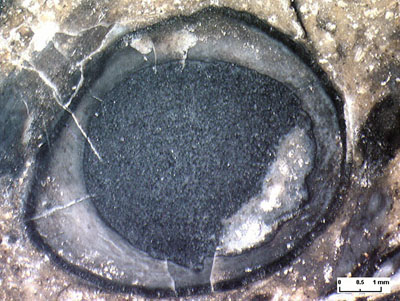Size matters - Aglaophyton
sporangia bigger than expected
Since the individual sizes of plants and their parts may vary
within wide bounds, occasionally found oversize specimens of a species
may be impressive but not significant. In the case of Rhynie chert
plants, however, the bounds have not yet been firmly established so
that new data concerning sizes will be of interest. This applies even
to the most abundant plant in the Rhynie chert, Aglaophyton major.
Under its old name, Rhynia
major, its height was once thought to reach
half a meter but now a value of 18cm is preferred. One wonders how this
seemingly accurate value may have been obtained as it is very
cumbersome to find out the original height of a plant embedded in
chert. So the suspicion arises that an estimate of "nearly 20cm" had
been transformed into "about 7 inches" and then back to centimeters,
which makes 18, the number found in various publications.

More easily accessible to measurement is the diameter of the sporangia.
Most often, of course, the sporangium is not cut perpendicular to its
axis but in a more or less inclined way so that the circular cross
section appears elliptical. Then the smaller axis of the ellipse can be
taken for the diameter of the sporangium, provided that it can be
excluded that the sporangium had been squeezed before silicification
and has been cut in such way that
the section does not represent the real size.
Fig.: Cross section of an Aglaophyton
sporangium bigger than usual:
diameter 6.5mm instead of < 5mm
as hitherto assumed.
Photograph by H.
Sahm.
According to the standard work on Aglaophyton
[1],
the diameter of the
sporangia is 4 to 5mm. (A limit < 4mm given in the
same paper is apparently a misprint and should be read < 5mm.) A
few sporangia with diameters above 6mm have
been found lately. A big
one with 6.5mm is shown here. The non-uniform thickness of the
sporangium wall is an artifact due to partial detachment of the outer
layer and damage to the inner layer by spore eaters.
More
observations on Aglaophyton
can help to establish a consistent picture
of this plant.
H.-J.
Weiss 2005
[1] D.S.
Edwards : Aglaophyton
major,
a non-vascular
land-plant from the Devonian Rhynie Chert.
Bot. J. Linn. Soc. 93(1986), 173-204.
 |
 |
11 |




